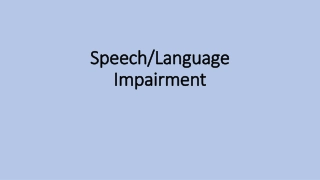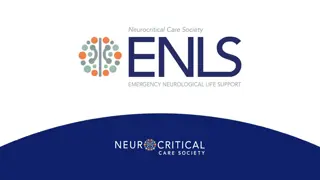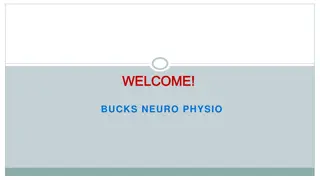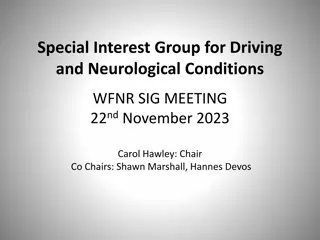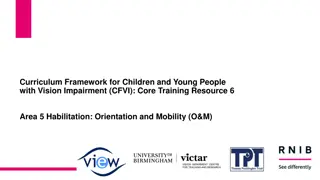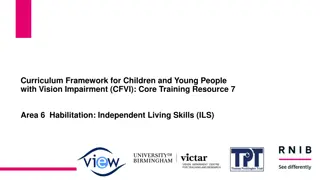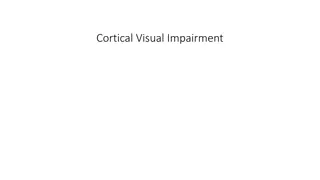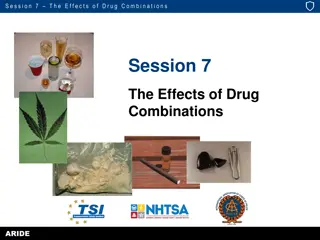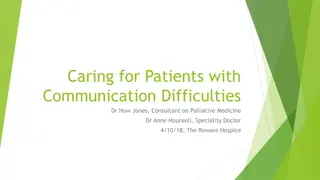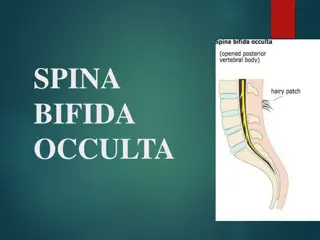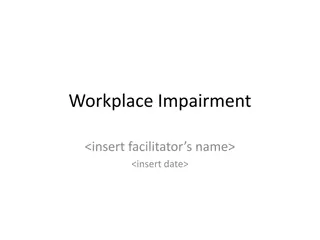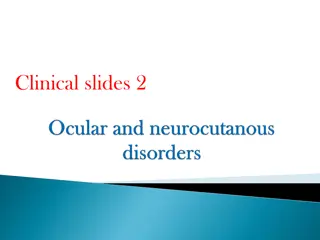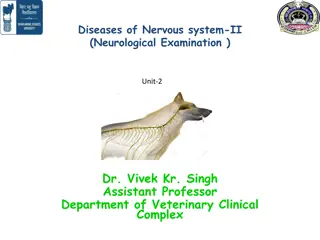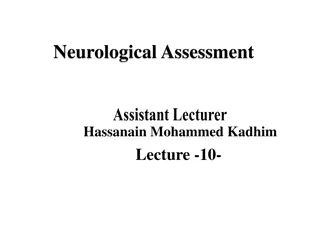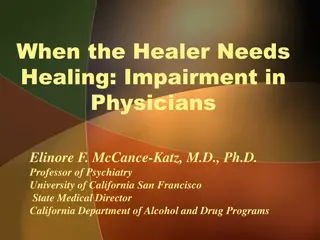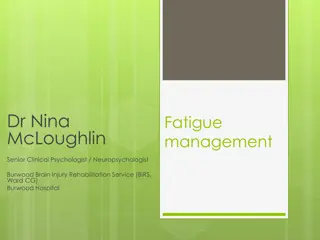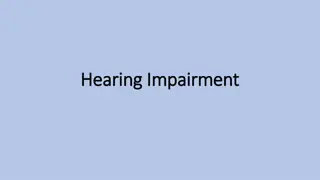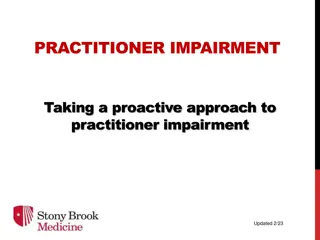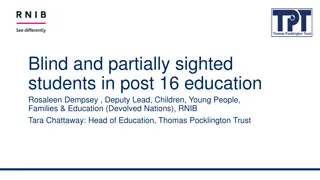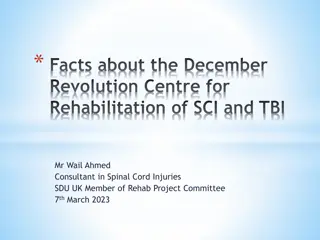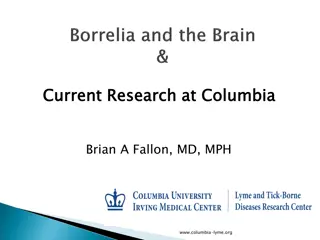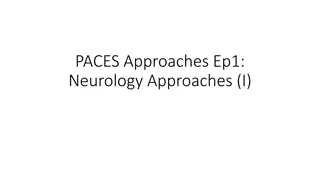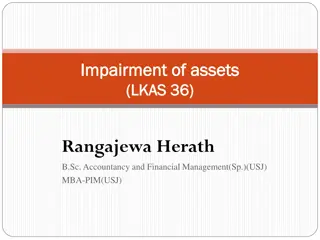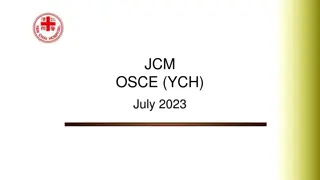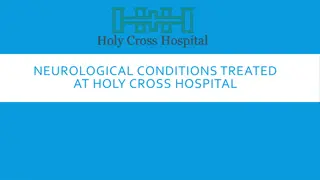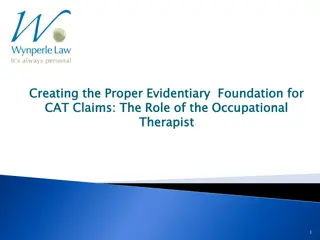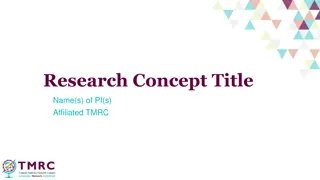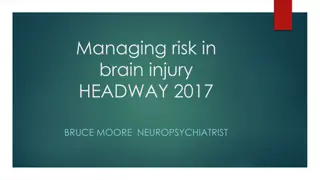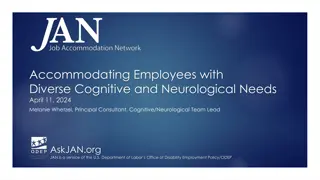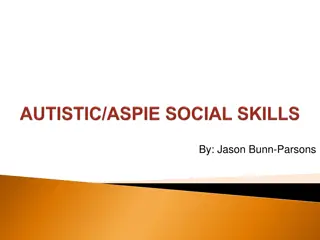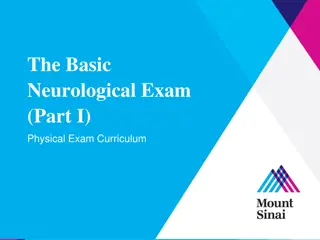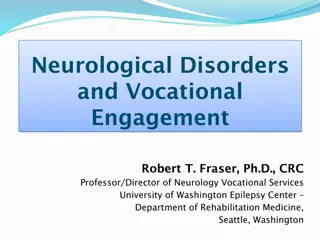Speech/Language Impairment
Explore the impact of speech and language impairment on educational performance, criteria for identification under IDEA, eligibility considerations, and the role of communication disorders. Gain insights into language dimensions and speech production processes.
0 views • 14 slides
Language Theory and Development: A Review
This review covers essential resources in communication sciences and disorders, multicultural strategies for special language needs, and advancements in social communication development and disorders. It also delves into effective strategies for managing challenging behaviors in individuals with ASD
0 views • 71 slides
Legal and Ethical Challenges in Determining Death Using Neurological Criteria
Explore the intricate legal and ethical dilemmas surrounding the determination of death using neurological criteria. Delve into cases like the Archie Battersbee Case, various legal challenges, and societal expectations regarding defining life and death. Understand the complexities faced in making cr
5 views • 38 slides
Airway Management in Neurological Patients: ENLS Version 5.0
Explore the essentials of airway, ventilation, and sedation in neurological patients through the ENLS Version 5.0 content. Understand the challenges and goals of managing airways in critical situations such as trauma or respiratory distress. Learn about common indications for intubation and the impo
0 views • 37 slides
Looking for the best Physical Therapist in Hazlemere
Are you looking for the Best Physical Therapist in Hazlemere? Then visit Bucks Neuro Physio. They are passionate about providing personalized physiotherapy at home, specializing in neurological conditions. They are a group of experienced physiotherapists who provide quality physiotherapy. They passi
0 views • 6 slides
SIG Meeting for Driving and Neurological Conditions - WFNR 2024
Explore the intersection of driving and neurological conditions at the Special Interest Group (SIG) meeting in November 2023. Discover the importance of driving for mobility and independence, along with future goals to expand the SIG's reach. Engage in workshops, discussions, and exhibitions focusin
0 views • 5 slides
Curriculum Framework for Children and Young People with Vision Impairment: Habilitation - Orientation and Mobility
The Curriculum Framework for Children and Young People with Vision Impairment focuses on Habilitation: Orientation and Mobility, providing training objectives, partner organizations, and information on teaching individuals with vision impairment to navigate their surroundings safely. The resource of
0 views • 21 slides
Habilitation: Independent Living Skills Training Resource for Children and Young People with Vision Impairment
The Curriculum Framework for Children and Young People with Vision Impairment (CFVI) provides core training resources focusing on Area 6 - Habilitation: Independent Living Skills (ILS). This resource aims to introduce the concept of habilitation, explore barriers to inclusion, and offer intervention
0 views • 20 slides
Understanding Cortical Visual Impairment in Infants
Cortical Visual Impairment (CVI) is a condition resulting from retrogeniculate brain damage that affects visual processing in infants. Commonly observed in premature infants, CVI can manifest as atypical behaviors like staring at lights, optic atrophy, and nystagmus. The causes range from structural
2 views • 23 slides
Understanding the Effects of Drug Combinations in ARIDE Session 7
Dive into Session 7 of the ARIDE program to explore the prevalence of drug and alcohol use, the concept of polydrug impairment, and the potential effects of combining different substances. Learn about null effects, overlapping effects, and how various drug combinations can impact impairment indicato
0 views • 18 slides
Understanding Impairment of Assets in IFRS for SMEs - 2019
This content discusses the Impairment of Assets in IFRS for SMEs, focusing on determining the true economic benefits of assets for accurate financial representation. It covers exceptions, impairment tests, inventory valuation, and recognizing valuation/impairment losses for inventory categories. A c
1 views • 23 slides
Communicating with Patients with Cognitive Impairment and Other Communication Difficulties
This presentation highlights the causes of communication difficulties in patients, focusing on cognitive impairment, sensory impairments, and language barriers. It emphasizes the challenges of caring for these patients, including assessing pain and managing symptoms effectively. Practical strategies
0 views • 27 slides
Understanding Spina Bifida Occulta: Symptoms, Causes, and Treatment
Spina Bifida Occulta is a common neural tube defect, usually mild and hidden. It affects the lumbosacral area, characterized by vertebral arches not fusing, resulting in spinal processes defects without external protrusion. Common features include dimples, hairy patches, and normal spinal cord. Neur
0 views • 10 slides
Understanding IFRS 9 Financial Instruments & Impairment: Key Principles and Impact
Explore the key principles of IFRS 9 Financial Instruments, focusing on classification, measurement, impairment, and expected credit loss overview. Gain insights into the impact on financial statements across different stages, accounting for modifications, and identifying impairment in various finan
0 views • 12 slides
Workplace Impairment Awareness Training
Explore the concept of workplace impairment, its impact, and ways to address it in this informative presentation. Topics include identifying impairment, understanding its implications, supporting employees, and promoting a safe work environment. Engage in discussions on how impairment can affect job
0 views • 23 slides
Understanding the Epidemiology of Disability and Its Impact on Health
Epidemiology focuses on studying disease causes, prevention, and control. Impairment, disability, and handicap are defined by the WHO. Impairment refers to loss or abnormality of function, disability refers to limitations in normal activities due to impairment, and handicap indicates social disadvan
0 views • 31 slides
Understanding Neurological Conditions: Clinical Slides and Symptoms
This presentation covers various neurological conditions including oculomotor nerve palsy, Horner's syndrome, and shingles caused by the varicella-zoster virus. It explains the symptoms, causes, and characteristics of these conditions with accompanying clinical slides. Learn about the signs and symp
0 views • 24 slides
Comprehensive Guide to Neurological Examination in Dogs and Cats
Neurological examination in dogs and cats is crucial for diagnosing nervous system disorders. This guide covers the recording of history, general and detailed clinical examinations, examination of CSF, radiographic examination, EEG, and brain biopsy. It includes assessing history, mental state, move
0 views • 20 slides
Understanding Neurological Exams: Assessment and Procedures
A neurological exam evaluates a person's nervous system using various instruments in a healthcare setting. This comprehensive assessment includes evaluating motor and sensory functions, balance, coordination, mental status, reflexes, and cranial nerve functionality. Assessing mental status involves
0 views • 18 slides
Understanding Physician Impairment Due to Substance Use Disorders
Physician impairment due to substance use disorders can severely impact patient safety and clinical outcomes. This article explores the definition, causes, warning signs, assessment, treatment, and return to practice protocols for impaired physicians. Substance abuse in physicians can lead to behavi
0 views • 50 slides
Practical Techniques for Managing Fatigue in Clients with Neurological Conditions
This session by Dr. Nina McLoughlin, a Senior Clinical Psychologist/Neuropsychologist, focuses on practical fatigue management techniques for clients with brain injuries, strokes, and other neurological conditions. Emphasizing the importance of addressing sleep as the primary intervention point, the
0 views • 33 slides
Understanding Hearing Impairment and Its Impact on Education
Hearing impairment, whether permanent or fluctuating, can adversely affect a child's educational performance. In the educational context, terms like deafness, hard of hearing, and hearing loss are used instead of hearing impairment. Eligibility criteria for special education services under IDEA requ
0 views • 11 slides
Understanding Physician Impairment and Addiction Risks
Physician impairment due to mental illness, physical conditions, or substance abuse is a serious concern in the medical field. This article discusses the definition of impairment, signs of professional misconduct, and statistics related to substance use disorders among physicians. It emphasizes the
0 views • 21 slides
Workshop on Supporting Blind and Partially Sighted Students in Post-16 Education
This workshop aims to address barriers faced by students with vision impairment, focusing on necessary skills for post-college life and available support for positive transitions. Topics covered include curriculum framework, maximizing educational opportunities, transitioning to future endeavors, an
0 views • 23 slides
Understanding Spasticity and Increased Muscle Tone in Neurological Disorders
Spasticity and increased muscle tone are common features in neurological disorders, characterized by hyperactive stretch reflexes and muscle contractions. Spasticity is velocity-dependent and associated with upper motor neuron lesions, leading to increased resistance to passive movement. Rigidity, o
0 views • 28 slides
Development of a Tertiary Neurological Rehabilitation Centre in Sudan
The December Revolution Centre for Rehabilitation of Traumatic Spinal Cord and Brain Injuries at Khartoum Teaching Hospital addresses the lack of holistic patient-centered rehabilitation services in Sudan. Following the December 2018 Revolution, the need for specialized care for victims with spinal
0 views • 11 slides
Neurological Complications of Lyme Disease: Symptoms and Markers
In patients with Lyme disease, various neurological complications can arise, including inflammation of brain tissues, cranial nerves, and membranes around the brain. Symptoms range from headaches and neck stiffness to cognitive changes, mood swings, and sensory numbness. Specific markers, such as el
0 views • 24 slides
Approach to Headache and Neurological Symptoms in Clinical Practice
Comprehensive overview of primary and secondary headaches, red flags, and patterns in neurological presentations. Discusses distinguishing features, differential diagnoses, and management approaches for various conditions affecting the central and peripheral nervous system. Highlights important cond
0 views • 16 slides
Understanding Impairment of Assets in Financial Management
Entities must periodically test for impairment to ensure assets are not overstated. An impairment loss occurs when an asset's carrying amount exceeds its recoverable amount. Assets like inventories and deferred tax assets may require testing. Learn when to undertake impairment tests, key indicators,
0 views • 19 slides
Clinical Cases Review: Neurological, Toxicological, and Orthopedic Presentations
Explore a collection of intriguing clinical cases including neurological symptoms, toxic ingestion, loss of consciousness, and orthopedic injuries. From CT findings to treatment modalities, delve into differential diagnoses, imaging investigations, risk factors, complications, and management strateg
0 views • 13 slides
Comprehensive Neurological Care at Holy Cross Hospital
This content provides detailed information on the neurological conditions treated and managed at Holy Cross Hospital, including stroke, acquired brain injury, multiple sclerosis, and more. It also discusses the key principles of care focusing on person-centered approaches and covers various aspects
1 views • 72 slides
The Role of Occupational Therapists in Establishing Evidentiary Foundation for Catastrophic Impairment Claims
Exploring the pivotal role of occupational therapists in creating a solid evidentiary foundation for catastrophic impairment claims, this content delves into a case study involving Mrs. Mujku, highlighting the significance of proper assessments and expert opinions. The narrative showcases the challe
0 views • 15 slides
Approach to Acute Flaccid Paralysis in Children: Evaluation and Management
Acute muscular weakness in children is a neurological emergency defined by sudden onset muscle weakness or paralysis in less than 5 days. When evaluating a child with acute flaccid paralysis, consider factors like onset rhythm, associated symptoms, and past medical history. A thorough physical and n
0 views • 45 slides
Understanding Hallucinations through Ecological Perception and Neurological Evidence
Exploring the phenomenon of hallucinations in relation to the ecological approach to perception, direct vs. indirect realism, and the concept of affordances in visual perception. Delving into the types of hallucinations, such as visual and complex hallucinations, and conditions like Charles Bonnet S
1 views • 16 slides
Collaborative Research Project on Neurological Disorders
This research project focuses on studying a specific neurological disorder with the overarching goal of advancing scientific knowledge in this field. The Principal Investigator and the affiliated TMRC will collaborate to investigate hypotheses, primary outcomes, and study population, aiming to provi
0 views • 8 slides
Managing Risk in Brain Injury: Strategies and Considerations
This informative content covers essential aspects of risk management in brain injury, including balancing client needs, promoting independence, and positive risk taking. It delves into the different parts of the brain, their functions, and the potential effects of brain injury on intellectual, behav
0 views • 14 slides
Accommodating Employees with Diverse Cognitive and Neurological Needs - Training Overview
Explore the complexities of accommodating cognitive and neurological disabilities in the workplace, such as mental health conditions, ADHD, brain injuries, and seizure disorders. Learn effective solutions for maintaining productive employees with diverse needs in this informative session.
0 views • 25 slides
Understanding Autism: Embracing Neurodiversity
The inherent needs and desires of Autistics/Aspies are no different from those of any other human beings, despite facing unique challenges in getting them met. This atypical neurological connectivity paradox leads to heightened activity in certain brain areas and decreased activity in others. Unders
0 views • 85 slides
Comprehensive Guide to Neurological Exams
This guide provides a detailed overview of neurological exams, focusing on components such as cognition, motor function, and cranial nerves. It covers essential aspects like mental status, reflexes, sensation, and gait assessment. The importance of thorough examination in primary care settings is em
0 views • 29 slides
Understanding Neurological Disorders and Vocational Rehabilitation
Explore the vocational profile of major neurological conditions such as Traumatic Brain Injury, Epilepsy, Stroke, Multiple Sclerosis, and Autism. Learn about the work return rates, predictors of successful employment, and the mission of NVSU in providing employment services to individuals with neuro
0 views • 28 slides
